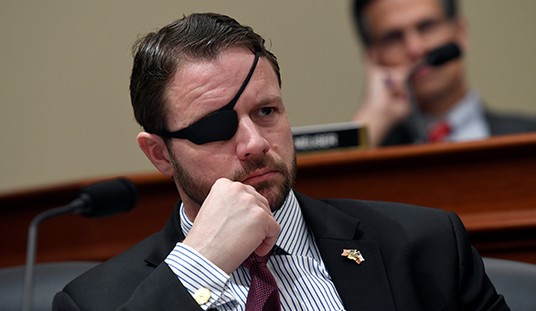British television viewers were last week treated to the extraordinary spectacle of the openly racist leader of an openly racist party — and a Holocaust denier to boot — appearing on a prime-time political panel show, on which he attempted to defend his mostly indefensible views in the face of an onslaught from hostile fellow panel members and an even more hostile studio audience.
Nick Griffin, leader of the British National Party and recently elected member of the European Parliament, appeared on the BBC’s Question Time after BBC bosses refused to give in to pressure to exclude him. The result was an entirely predictable media circus, with Griffin jeered at every turn while anti-racism campaigners battled with police outside the studio.
It’s hard to know what the BBC’s motives were. Perhaps they really were playing by the rules and acknowledging Griffin’s right to be heard. Perhaps the leftists who run the BBC thought they were cleverly giving Griffin enough rope to hang himself. Or perhaps, as this story in the UK’s Telegraph suggests, they simply wanted to generate publicity and boost the ratings for Question Time — both of which they succeeded spectacularly in doing.
Even among the majority who are opposed to the BNP, opinion on Griffin’s appearance was sharply divided. In one camp were those who said that by allowing the BNP to share a platform with mainstream politicians, the BBC was giving the party respectability and a public relations coup. On the other side were those who said that, no matter how odious its views, the BNP had a right to be heard, and that banning the party would allow it to don the cloak of free speech martyrs and drive its support underground. And, they argued, allowing the party to spout its nonsense would expose its members for what they truly are and drive away potential supporters.
Depending on which report you believe, Griffin’s appearance was either a spectacular victory for the BNP or a spectacular failure. The reality is that it was probably neither. Those who either supported or opposed the BNP will have had their attitudes hardened, while a few undecideds may have been persuaded one way or the other.
Outside of the BNP’s relatively small number of supporters, opposition to the party and its policies is overwhelming, both among people of all political stripes and those not ordinarily concerned with politics. Yet it was old-school, hard-left Labour politicians, left-wing commentators, and pressure groups who most vociferously demanded that the BNP should be censored.
Why such palpitations from the left, when so many Britons oppose the BNP so emphatically? The answer is to be found in a poll conducted for the Telegraph in the wake of Griffin’s sixty minutes of infamy. More than a fifth of voters said they would “seriously consider” voting for the BNP — a troubling number, but, assuming that perhaps half of that group make good on their threat, not enough to enable the party to extend its representation beyond the current scattering of local councillors and two Euro MPs. But the more telling statistic was that more than half of those questioned thought the BNP “had a point.”
And that’s a problem not only for the ideological left, but for both of Britain’s main political parties. The British National Party, deeply unpleasant though it might be, has a point. In fact it has several points, and they’re points that neither Labour nor the Conservatives are at present willing or able to address.
The BNP speaks to the white working classes, a constituency which feels increasingly alienated, neglected, and abandoned by a “New” Labour party which once drew the bulk of its support from those same people. In broad terms, these are people who feel left behind by the pace of social and economic change. They are concerned about the erosion of what they see as their British identity under a government obsessed with promoting multiculturalism. More pressingly, they feel under pressure from mass immigration, angered by the continuing transfer of political power away from their elected leaders and into the hands of unaccountable bureaucrats of the European Union, concerned by rising crime, and alarmed by the spread of Islamic extremism.
The last time the far right (to use the term in its broadest and laziest sense) made inroads into British political life, in the 1970s, they were killed off by the arrival of Margaret Thatcher, who stood up for British interests and addressed the concerns of the working classes without pandering to racist attitudes. The economic chaos that accompanied the fall of the Labour government in 1979 was exploited by racist and nationalist groups, and it’s no coincidence that now, as then, such elements are growing in popularity during the death throes of a Labour administration.
Thatcher was largely able to repair the damage. These days, however, the malaise runs deeper. Labour long ago lost the big battles of economic ideas to the Conservatives, but Britain’s cultural establishment has succeeded in making left-wing and “progressive” views on immigration, Europe, and crime the orthodoxy of the ruling classes, despite their unpopularity at the ballot box. (A former Labour advisor recently revealed how Tony Blair and his ministers encouraged mass immigration to socially engineer a “multicultural” Britain and “rub the right’s noses in diversity.”)
Those who comprise the establishment are insulated from the problems which have turned their less privileged countrymen toward extremists such as the BNP. The elites don’t live in those parts of London where you take your life in your hands when you get on public transport or where children have to run the gauntlet of gangs armed with guns and knives in order to get to school. Nor do they live in the northern cities, where Islamic extremist preach jihad at Friday prayers. Yet they feel eminently qualified to tell others how they should behave and what they should think.
So anyone who voices legitimate concerns about virtually unregulated mass immigration or suggests that it would be a good thing if immigrants who arrive legally were encouraged to integrate into society is branded a racist. And anyone who voices the opinion that maybe British voters should be able to have a say in how they’re governed, rather than having laws imposed on them from Brussels, is labeled a xenophobe.
The British left is more angry than usual these days because the rise of far-right extremism during a long period of ostensibly progressive government doesn’t make progressive policies look good. But so successful has been the left’s distorting of the debate — there is no “far left,” only the “far right” and, on the other side, “normal” people — that the Conservatives have been cowed into silence on issues that matter deeply to a majority of the British people.
And if the Tories fail to address the problems that have festered for the past twelve years, the extremists will grow stronger. If a rabble of a party like the BNP, with its repellent leader and half-baked set of policies, can attract the support of a million voters, there’s a real danger that more articulate and persuasive racists will one day become serious players in British political life.








Join the conversation as a VIP Member